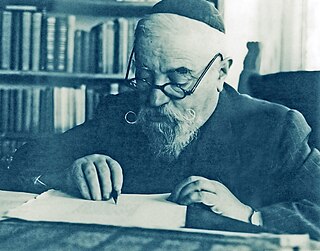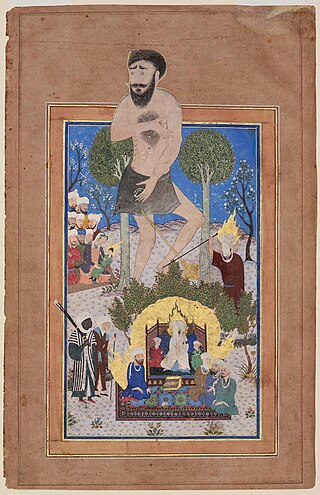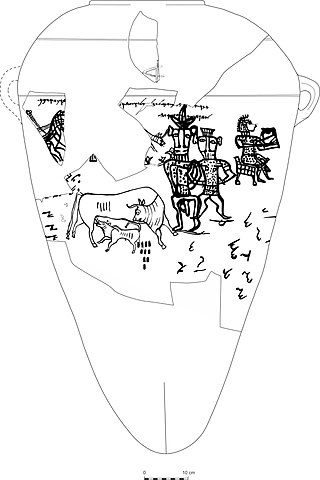
Baal, or Baʻal, was a title and honorific meaning 'owner', 'lord' in the Northwest Semitic languages spoken in the Levant during antiquity. From its use among people, it came to be applied to gods. Scholars previously associated the theonym with solar cults and with a variety of unrelated patron deities, but inscriptions have shown that the name Ba'al was particularly associated with the storm and fertility god Hadad and his local manifestations.

ʼĒl is a Northwest Semitic word meaning "god" or "deity", or referring to any one of multiple major ancient Near Eastern deities. A rarer form, 'ila, represents the predicate form in Old Akkadian and in Amorite. The word is derived from the Proto-Semitic *ʔil-, meaning "god".

Ugarit was an ancient port city in northern Syria, in the outskirts of modern Latakia, discovered by accident in 1928 with the Ugaritic texts. Its ruins are often called Ras Shamra after the headland where they lie.

William Foxwell Albright was an American archaeologist, biblical scholar, philologist, and expert on ceramics. He is considered "one of the twentieth century's most influential American biblical scholars", having become known to the public in 1948 for his role in the authentication of the Dead Sea Scrolls. His scholarly reputation arose as a leading theorist and practitioner of biblical archaeology.
Ugaritic is an extinct Northwest Semitic language, classified by some as a dialect of the Amorite language. It is known through the Ugaritic texts discovered by French archaeologists in 1929 at Ugarit, including several major literary texts, notably the Baal cycle. It has been used by scholars of the Hebrew Bible to clarify Biblical Hebrew texts and has revealed ways in which the cultures of ancient Israel and Judah found parallels in the neighboring cultures.

Asherah is a fertility goddess in ancient Semitic religion who appears in a number of ancient sources. She also appears in Hittite writings as Ašerdu(s) or Ašertu(s). Her name is sometimes rendered Athirat in the context of her cult at Ugarit.

Elohim, the plural of אֱלוֹהַּ, is a Hebrew word meaning "gods" or "godhood". Although the word is plural, in the Hebrew Bible it most often takes singular verbal or pronominal agreement and refers to a single deity, particularly the God of Israel in the majestic plural. In other verses it refers to the singular gods of other nations or to deities in the plural.

Umberto Cassuto, also known as Moshe David Cassuto, was an Italian historian, a rabbi, and a scholar of the Hebrew Bible and Ugaritic literature, in the University of Florence, then at the University of Rome La Sapienza. When the 1938 anti-Semitic Italian racial laws forced him from this position, he moved to the Hebrew University of Jerusalem.
Ancient Semitic religion encompasses the polytheistic religions of the Semitic peoples from the ancient Near East and Northeast Africa. Since the term Semitic itself represents a rough category when referring to cultures, as opposed to languages, the definitive bounds of the term "ancient Semitic religion" are only approximate.

Joseph Augustine Fitzmyer was an American Catholic priest and scholar who taught at several American and British universities. He was a member of the Society of Jesus (Jesuits).
Cyrus Herzl Gordon was an American scholar of Near Eastern cultures and ancient languages.
Sons of God is a phrase used in the Tanakh or Old Testament and in Christian Apocrypha. The phrase is also used in Kabbalah where bene elohim are part of different Jewish angelic hierarchies.

In the Hebrew Bible, as well as non-Jewish ancient texts from the region, the Northwest Semitic term Rephaite or Repha'im refers either to a people of greater-than-average height and stature in Deuteronomy 2:10-11, or departed spirits in the Jewish afterlife, Sheol as written in the following scriptures: Isaiah 26:14; Psalms 88:11, and Proverbs 9:18, as well as Isaiah 14:9.

Frank Moore Cross Jr. (1921–2012) was the Hancock Professor of Hebrew and Other Oriental Languages Emeritus at Harvard University, notable for his work in the interpretation of the Dead Sea Scrolls, his 1973 magnum opusCanaanite Myth and Hebrew Epic, and his work in Northwest Semitic epigraphy. Many of his essays on the latter topic have since been collected in Leaves from an Epigrapher's Notebook.

William M. Schniedewind holds the Kershaw Chair of Ancient Eastern Mediterranean Studies and is a Professor of Biblical Studies and Northwest Semitic Languages at the University of California, Los Angeles.
Jon Douglas Levenson is an American Hebrew Bible scholar who is the Albert A. List Professor of Jewish Studies at the Harvard Divinity School.
Shapshu or Shapsh, and also Shamshu, was a Canaanite sun goddess. She also served as the royal messenger of the high god El, her probable father. Her most common epithets in the Ugaritic corpus are nrt ỉlm špš, rbt špš, and špš ʿlm. In the pantheon lists KTU 1.118 and 1.148, Shapshu is equated with the Akkadian dšamaš.

The origins of Judaism lie in the Bronze Age amidst polytheistic ancient Semitic religions, specifically evolving out of the polytheistic ancient Canaanite religion, then co-existing with Babylonian religion, and syncretizing elements of Babylonian belief into the worship of Yahweh as reflected in the early prophetic books of the Hebrew Bible.
F. W. "Chip" Dobbs-Allsopp is a biblical scholar, epigrapher, and literary theorist. Currently professor of Old Testament, or Hebrew Bible, at Princeton Theological Seminary, he has taught and written extensively on Semitic languages, the origins of alphabetic writing, biblical poetry, poetics, and literary criticism.

Yahwism is the name given by modern scholars to the religion of ancient Israel and Judah. Yahwism was essentially polytheistic, with a plethora of gods and goddesses. Heading the pantheon was Yahweh, the national god of the Israelite kingdoms of Israel and Judah, with his consort, the goddess Asherah, and second-tier gods and goddesses such as Baal, Shamash, Yarikh, Mot, and Astarte, each of whom had their own priests and prophets and numbered royalty among their devotees.












